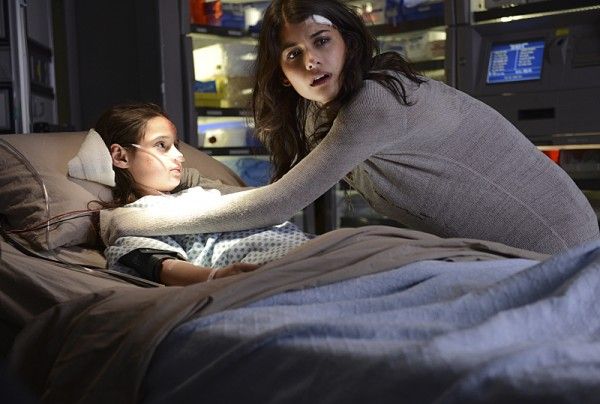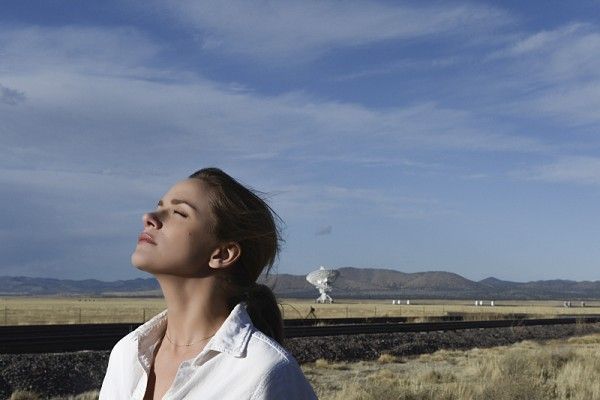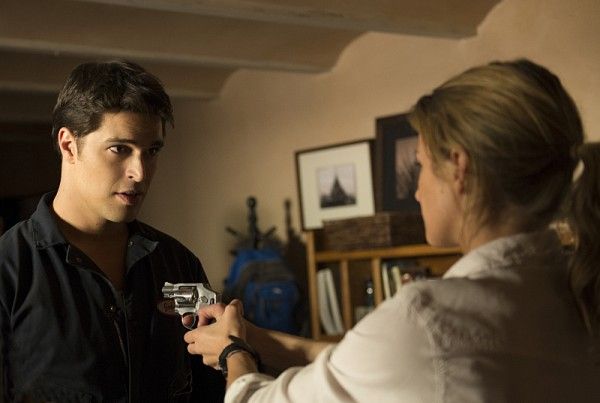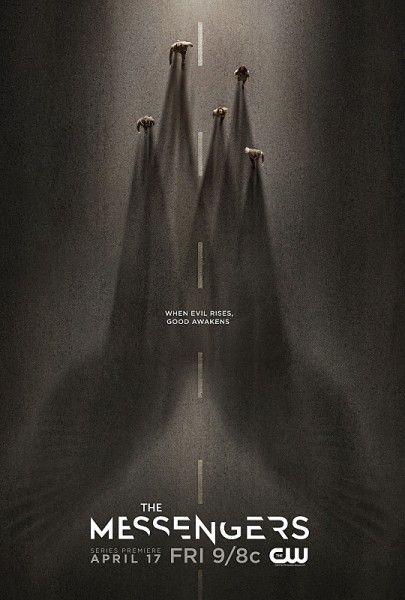The new CW series The Messengers explores what happens after a mysterious object plummets to Earth and explodes in a blinding flash, sending out a shock wave that instantly connects a group of strangers with extraordinary gifts, from inexplicable strength to the ability to heal others. As these Angels of the Apocalypse learn that they may be the only hope for preventing the impending Rapture, a mysterious figure known only as The Man (Diogo Morgado) brings death and suffering wherever he appears.
During this exclusive interview with Collider, executive producer Trey Callaway talked about how the concept for this show evolved, keeping this a character-driven story within the mythology that they’ve established, the core values of the story, the motivations of The Man, the influence of God vs. the Devil, sparingly showing the wings of these new Angels of the Apocalypse, the challenges of having such a large cast, and whether the larger population is aware of what’s going on, in the world of the show. Be aware that there are some spoilers.
Collider: When it comes to supernatural shows, people often think about different types of creatures. How did this come about?
TREY CALLAWAY: No pun intended, but it was a gift from God. I’ve worked on those shows. I worked on Supernatural. It was one of those rare occurrences where Eoghan [O’Donnell] was inspired to sit down and write a spec pilot that spoke to him, that then spoke to folks at CBS Studios, and then they came looking for me. It was one of those rare occasions where, the first moment I read it, I was like, “Oh, my god! I don’t know where this is going necessarily, but I’m in!” It felt like it was about something from a deeply rooted character perspective.
Then, when the pilot got picked up, Eoghan and I got together and immediately hit it off. I had a very similar experience on the very first pilot I ever wrote. It was a spec pilot that went to series, and it was a big sci-fi, epic series, called Mercy Point. I immediately recognized the terrified look in Eoghan’s eyes of, “Okay, now what?!” But we creatively just hit it off, immediately, and then set about the business of answering that question of, “Now what? How do we tell a continuing story that is loosely based on and interpretive of this very powerful mythology in the Book of Revelation?”
There have been many times in my career where, if you even mention the world religion, they run screaming, and I understand why. But at Upfronts, when Mark Pedowitz introduced this as, “Our Rapture drama,” I looked at Eoghan and said, “He said Rapture.” Later that night, Mr. Pedowitz pulled me aside, looked me right in the eye and said, “Don’t shy away from the Book of Revelation. Don’t shy away from exploring theology of all different kinds. That’s not what this show is about, but don’t run from it.” That was so liberating for Eoghan and I, who come from the same part of the country and literally went to the same church camp together.
To be able to spend a couple of months, really digging into the meat and potatoes of the very character-driven story of what it would be like, if suddenly somebody slapped you upside the head with a completely different destiny, which you may or may not believe in, whatsoever, and you certainly don’t have time to deal with. And then, we had to take that and use that to play against this mythology that’s very rich in metaphor and poetry and is very interpretive. How can we take that and filter it through a 21st century lens, but also make it about the people at the center? It’s been so rewarding to work on this project, from that aspect. We didn’t have to avoid it, but that didn’t mean we had to make the show about that. It’s a part of it, in the same way it’s a part of all of our lives.
What do you want people to know about this show, going into it?
CALLAWAY: David Gelernter, who is a brilliant Yale computer scientist, artist and author narrowly survived an attack by the Unabomber, a couple decades ago. He wrote this beautiful book, called Drawing Life, which was his attempt to wrap his head around what had happened to him and why. He espouses this notion of what he calls the Religion of Ought, which is to say that no matter what you believe in, in life, or whether or not you believe in anything, we can all generally agree that there is a short list of things we ought to do or ought not to do. We ought to be kind, we ought to be loving, we ought not start wars, we ought to be tolerant and respectful, whenever possible, and we ought to protect humanity. Those are the core values, not only of The Messengers, but of most of our audience, regardless of age. Using that as a base, it just makes it really satisfying to tell this very emotional tale of people who are coming to terms with that, sometimes for the first time, or having to re-examine the way they thought they believed those things.
You have a character that you just call The Man. Will we learn pretty quickly what his motivations are?
CALLAWAY: You’re absolutely going to learn pretty quickly what you think the motivations are. In some cases, that would be correct. In other cases, that would be far more complex. Arguably, one of the most complex figures in literary and mythological history, and for avid believes in real life, is the Devil himself. This is a character who is probably the most profoundly insecure you can imagine, who has literally been cast down from Heaven for hubris, and as you’ll learn in our show, has been cast down a second time for similar hubris. He’s been very clearly warned about interfering with The Messengers and their destiny, in any way. The great weakness of the Devil is that he never listens because his ego has been too badly bruised, but his greatest strength is his ability to read the insecurities of all of us, and then manipulate us, accordingly. This story really is about the choices our characters will make at critical times, when they may often, even without knowing it, have the Devil whispering in their ear.
The original pilot was about four or five minutes short, which gave us a little real estate to fill in some blanks, and one of the things that we chose to do in that process was to make it a little more clear that The Man is not just The Man. He is this mythical figure, which we get into further in the second episode and beyond. We will tell a continuing story and we will have a very clear mission for The Messengers, but there are two figures in the story, one of whom is present all the time and one of whom is omnipresent without necessarily being on screen, and that’s the Devil and God, in whatever notion you choose to believe in them. The Devil, for his part, has a very clear agenda. On the one hand, he wants to interfere with what The Messengers are trying to accomplish, in many respects, but on the other hand, he might find himself having to curry favor with us, and our characters may find themselves having to rely on him more than they’re comfortable with. There are definitely some very strange bedfellows, in that process. At times, their goals might actually line up, as frightening as that may be for The Messengers to contend with.
It’s very complex, in that regard. But what’s not complex is that there’s just genuine human emotion in the story, and that’s something we’ve been really successful in doing. As fascinating as the mythology may be, and it will always be a critical part of the show, we don’t want to slide so far down that rabbit hole that we forget why the story is important. No matter what you believe in, the reason any notion of an apocalypse is important is that it represents a loss of the people you care about the most. Without being preachy, in any way, shape or form, the show really grabs you by the heartstrings. It takes you on a ride, and then it sneaks up and grabs you by the heart, and that’s been really satisfying to watch.
These Messengers are essentially becoming Angels of the Apocalypse. How did you decide how you wanted to show their wings?
CALLAWAY: With great reluctance. As storytellers, we don’t want to give it all up immediately. More importantly for the characters and the way they drive the story, they are reluctant heroes and reluctant prophets. They are not comfortable with looking at themselves in the mirror and seeing wings on their backs. We’re very selective about when we choose to show those kinds of moments. We’re not going to throw a harp in anybody’s hands. These are real people, and they have real choices to make here. It’s as if God has selected each of them for personal reasons, but also collectively. The notion is that, if these disparate individuals with their own personal agendas and issues can somehow figure out how to overcome all of that and work together with the rest of these strangers, than perhaps, as representatives of the human race, they can give everyone else an opportunity to do the same. But that means we don’t throw wings on them, all the time. We don’t throw them up in the sky. These are gifts, but they’re gifts that come at a personal cost. You can’t just indiscriminately use your extraordinary strength or your power to heal or your ability to hear people’s thoughts, or a number of others that we reveal over the season, because they come at a cost. That keeps them on their toes and makes them think first.
Will you be bringing these individuals together pretty quickly?
CALLAWAY: In Episode 2, they’re all brought together and they’re all informed about what their new mission is. That doesn’t mean that they necessarily accept it, or that it means any sense to them. In a number of cases, it certainly doesn’t mean that they believe any of it, or want to believe any of it. But by Episode 2, they are all brought together and it’s made clear what their mission is, should they choose to accept it.
Will they work together in a group, or will they be divided up a bit?
CALLAWAY: It will be a little bit of both. When you have a cast this big, you’ve gotta shake it up. So, there are times when they team up, and there are times when they work together collectively.
What are the challenges of having such a large cast?
CALLAWAY: Those scenes in which they’re all together are incredibly challenging to film. But because they each have these unique gifts, we’re able to pair them or split them off in ways that allow their gifts to compliment each other. There’s one collective mission, but there are a number of different missions throughout the season, and that allows us to naturally put certain people in certain places, to work towards the common goal of solving the problem.
Will the larger population figure out what’s going on, or will they remain unaware?
CALLAWAY: The short answer is no because we’d all think we’re crazy. It would certainly affect life, as we know it. So, they’re working under the radar, in terms of what the world knows and in the ways they interact with the world. They have a very important job to do, very quietly and very quickly.
The Messengers airs on Friday nights on The CW.





